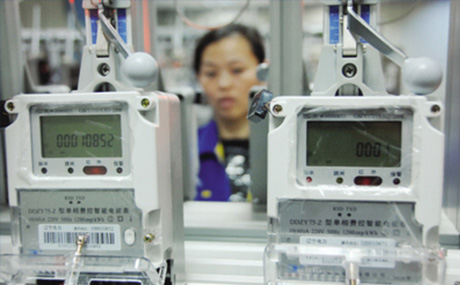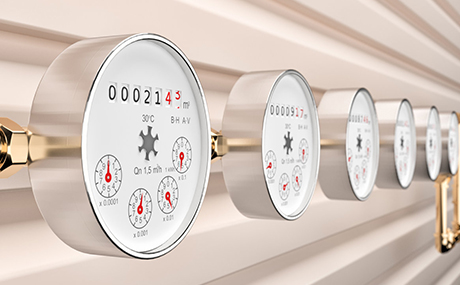Three Advantages of Intelligent Meter in China and Its Future Technological Deve
TIME:2019-08-13 VIEW: 15 FORM:Shenglong Technology
At present, smart meters are being deployed worldwide to make energy use reporting and monitoring more efficient and accurate. Since its inception, smart meters have been developing for nearly 20 years, and the technology level is becoming more and more mature. At present, the usage of smart meters in China has exceeded 400 million. According to the 13th Five-Year Plan, China will achieve 100% coverage of smart meters by 2020.

PREV : Three prerequisites for large-scale commercial use of intelligent water meters
NEXT : Nb-iot Intelligent Gas Meter Solutio

At present, in Shenzhen, since 2016, Shenzhen Power Supply Bureau has vigorously promoted the construction of intelligent meters and low-voltage centralized reading. At the end of April this year, Shenzhen Power Supply Bureau started the replacement of smart meters for the last 1800 users in the city, completed the last piece of jigsaw puzzle for the infrastructure construction of smart grid metering side, and smart meters will replace mechanical meters in an all-round way. In the past two years, Shenzhen has successively completed the replacement of more than 3.2 million smart meters and low-voltage centralized reading coverage.
Hall Sensor on Smart Meter
Compared with mechanical meters, intelligent meters have powerful functions and strong anti-theft power. According to the new regulations of Guodian, the new intelligent meter must be equipped with anti-theft function. When someone tries to damage the counter by applying external magnetic field, the meter needs to detect the external magnetic field, and the anti-theft system responds accordingly, so as to realize the anti-theft function.
For example, by installing Hall sensor to prevent electricity theft, it is a widely used and ideal solution. The principle is that Hall magnetic sensor can effectively detect the stealing electromagnetic field from the outside. When someone tries to damage the smart meter counter by applying external magnetic field, Hall magnetic sensor detects the external magnetic field and the anti-theft system responds accordingly, thus realizing the anti-theft function.
Generally speaking, three digital Hall sensors installed on a smart meter can effectively detect the magnetic field in the three axis directions of xyz. In practical products, four or five Hall sensor chips are even used to detect the stealing electromagnetic field from any direction outside the meter for the sake of safety.
Three Advantages of Intelligent Meter
In the smart grid architecture, many sensors are deployed in the entire grid infrastructure, which can be monitored, tested and communicated. As the foundation of smart city construction, smart meter is the most basic component of smart grid, and also an important source of basic data of smart grid. Through the application of big data, better customer service can be achieved. Specifically, smart meters have three main advantages.
One is to make the data collected remotely more objective and accurate. Through the electric power system, the electric power marketing business system can read the customer's voltage, current, electricity consumption and other electricity information in real time, and provide users with better service through the application of big data, such as more timely and accurate grasp of the end-user's electricity quality situation, timely and active solution of low-voltage and other electricity quality problems. The second is to enable faster response when power failure occurs, and the third is to prevent man-made errors caused by manual meter reading.
Future Development Direction of Intelligent Meter Technology in China
From mechanical electric energy meter to electronic electric energy meter, and now to intelligent electric energy meter, the function of electric energy meter has completed the evolution from solving the most basic requirement of accurate measurement and automatic meter reading to realizing pulse monitoring of power grid operation.
Cao Min, a senior technical expert of China Southern Grid Corporation, said that at present, smart meters are not only the statutory instruments for electricity billing and settlement, but also the important sensors of smart grid. At present, the fee control function of smart meter has been perfected, and the sensor function of smart meter still has a lot of value to be excavated. By analyzing the data collected by smart meters, we can not only see the operation of the power grid and the specific state of the equipment, but also understand the electricity consumption habits of power users, predict load changes, and carry out demand side management of users. Smart meters will be the basis of digitalization and intelligent transformation of power grid.
In the next stage, the development direction of smart meter technology is: first, the meter itself needs to meet the requirements of traceability of original data and separation of non-metering functions; second, it needs to upgrade to dual-core, multi-core, remote online operation system of meter, local edge calculation and data intelligent processing, M2M cooperation, data sharing and so on. Third, communication and network technology need to be upgraded and innovated.
In this context, many enterprises have developed a variety of communication and network technologies adapted to smart meters. For example, broadband carrier, low-power wireless, Bluetooth, four-network convergence communication and other technologies, some of which have been put into the market. In the end, which mode of communication can occupy the mainstream remains to be tested by the market.
Recommended news
-
 Please keep this history of super total water meter, water pipe antifreeze guide!TIME:2020-01-13VIEW:9The weather is freezingAre youMissing the warm days?I want to persuade the weather to be vigorousThe weather roar...
Please keep this history of super total water meter, water pipe antifreeze guide!TIME:2020-01-13VIEW:9The weather is freezingAre youMissing the warm days?I want to persuade the weather to be vigorousThe weather roar... -
 Next year, more than 20% of the built-up area of Shenyang will meet the requirements of sponge CityTIME:2019-12-26VIEW:7There is a city like this, it is like a sponge, it can make the rain breathe like a cell, it can make the ...
Next year, more than 20% of the built-up area of Shenyang will meet the requirements of sponge CityTIME:2019-12-26VIEW:7There is a city like this, it is like a sponge, it can make the rain breathe like a cell, it can make the ... -
 Intelligent gas meter is developing with the rapid development of gas industryTIME:2019-12-20VIEW:6The intelligent development of gas can be said to affect the heart of the whole industry. On the one hand, it...
Intelligent gas meter is developing with the rapid development of gas industryTIME:2019-12-20VIEW:6The intelligent development of gas can be said to affect the heart of the whole industry. On the one hand, it...
COPYRIGHT © SHENGLONGTECH ALL RIGHT RESERVED. 京ICP證000000号 WEB:XUANYUE







